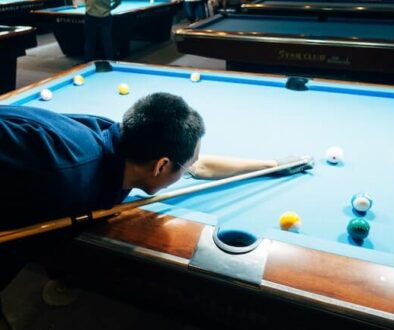Hustling in Pool: The Backstory and Fascination with Deceptive Billiards
Hustling has been a part of pool for almost as long as the game has existed. It’s even partially responsible for why pool has lost popularity over the years.
Some hustlers will hustle for fun, while others use it to make money by luring unsuspecting pool players to stake and play a game they can’t win.
Hustlers and the act of hustling are unethical, but many pool lovers are fascinated with it, especially given the glorification hustling has received in pop culture over the years.
In this article, we will tell you everything you need to know about hustling in pool, from what it is and if it’s legal, to how it’s done.
What is Hustling in Pool?
Hustling has been part of American culture for a long time. It is a fairly common act in gambling and other sports besides billiards.
In pool, hustling is an act of enticing a lesser-skilled or experienced opponent to put money on a game. The hustler (more experienced and talented player) usually disguises their skill to make the opponent think they will win, hence raising their bet.
The hustler will only reveal their actual skill later in the game when it’s too late for the other player to back out and the damage is already done.
Is Pool Hustling Legal?
Pool players like wagering when playing both for fun and competitively. A wager makes the game more competitive as it gives pool players some extra motivation and incentive to play better as there is something at stake.
While hustling is legal in some places, adding an element of deception amounts to trying to defraud someone, which usually makes it illegal. Also, hustling in a place where gambling is prohibited is unlawful.
But, illegal or not, hustling is cheating. So, hustling in pool is poor etiquette and unethical. It also comes with various risks and can easily land you in trouble.
Nobody wants to be taken for a fool or hustled out of their money. There is often a risk of confrontation when an opponent realizes they are being cheated.
Most bar and pool hall owners will also not tolerate hustling in their establishment, so they are likely to throw you out or even call the police when they realize what you’re doing.
What is a Pool Shark?
Some hustlers use “sharking” techniques to throw off their opponents as they lure them to play a match they cannot win. These sharking techniques will involve anything from distracting and disheartening to issuing actual threats.
These unorthodox hustling techniques are why pool hustlers are also often referred to as “pool sharks.”
A pool shark will do anything to lure an opponent into wagering or raising stakes knowing they are skilled and much better than them. This makes the match very unfair.
How to Hustle a Game of Pool
Hustling in a pool game is about showing a weaker and often overly confident opponent that they can easily win a match and hence make some quick cash.
The more skilled player disguises their skills and talents to increase the opponent’s confidence, pushing them to raise the stakes. Hustlers use several tricks to lure their target and sometimes have a “stakehorse” to help with the hustling.
How to hustle in pool:
- Start by playing a few games without wagering or with small wagers to study the opponent. Playing a few games for fun also helps create a perception that you’re easy to beat, so the opponent can make some quick cash.
- Play with cheap or house cues. Using a low-quality cue creates the perception that a hustler is still a newbie.
- Miss some easy shots. Hustlers will sometimes make some impressive or difficult shots, then miss easy shots. These theatrics convince the opponent that the few impressive shots are just luck.
- Pretend to be impaired or drunk. A hustler often pretends to have something wrong with them. Some hustlers even pretend to be outright dumb. This makes the opponent believe a win is guaranteed.
Ethics of Hustling in Pool
Hustling might not be outright illegal or a crime in some jurisdictions, but it is unethical. Hustlers are about making money, and some don’t even care about the game.
We do not condone hustling as a way of making money from playing pool. There are other ethical ways of making money as a pool player, such as participating in tournaments and playing worthy competition.
5 Most Famous Pool Hustlers Ever
Hustling might be unethical, but over the years, some pool players have been very good at it, making the vice quite popular and “cool” among cue sports enthusiasts. Here is a list of some of the most famous pool hustlers of all time:
1. Vernon “Burnie” Elliott
Vernon Elliott is one of the most renowned pool hustlers. Many billiards players consider him one of the best in the sport ever. He was most famous for making difficult bank shots that seemed impossible for other players.
Elliott defeated some of the game’s greatest during his long career in billiards and hustled most of their money in the process. He was a true hustler that would not play in any official tournaments and would often not even tell his opponents his real name as he wanted to remain under the radar.
Greatest Achievements:
- Defeated the game’s greatest players like Keith “Earthquake” McCready, Efren Reyes, and Ronnie Allen
- Inducted in the One Pocket Hall of Fame (Back Pool Legends division) in 2006
2. Larry Lisciotti
Larry Lisciotti started playing pool at a very early age. By the time he finished high school, he was already a pool hustler and quite good at it.
After graduating from high school, Lisciotti, or the “Prince of Pool” as he was later nicknamed, traversed the US looking for action in bars and pool halls.
Lisciotti’s hustling technique would often entail coming from behind to beat the opponent. In one incident in the 70s, while playing Tom Jennings, he came from behind by making an interrupted run of 125 balls in a 5-day event to win $10,000.
Greatest Achievements:
- Won the World Open Pocket Billiard Championship Challenge of Champions in 1976
- Won the Professional Pool Players Association Nine-ball Championship in 1980
3. “Cowboy” Jimmy Moore
James William Moore was a billiards legend from Troup County, Georgia but spent most of his life in New Mexico. He was a world-class pool player and also one of the best straight pool players of all time.
Cowboy Jimmy Moore started playing at 18 and participated in his first championships just 6 months after he first held a cue stick.
Jimmy’s pool hustling career began by partnering with Ray St. Laurent, who mentored and taught him how to hustle. But Moore was a much better player than St. Laurent.
He would later abandon Ray and partner with Don Willis to kickstart a pool hustling career that would last over 5 decades.
Unlike many other hustlers, he participated in formal tournaments and championships and won several of them.
Greatest Achievements:
- Inducted into several halls of fame
- Albuquerque Sports Hall of Fame – 1998
- Billiard Congress of America’s Hall of Fame – 1994
- International Pocket Billiards Hall of Fame – 1982
- Won National Invitation Pocket Billiards in 1958 & 1965
- Won Michigan State Billiard Championship 4 times
- Finished second 10 times in world-title competitions
4. Titanic Thompson
Titanic Thompson’s real name is Alvin Clarence Thomas, one of the most fascinating hustlers of all time. His hustle career spanned several sports and not just billiards. He was also a golfer and a gambler.
Titanic Thompson became a traveling hustler after honing his skills and would travel the US looking for action. He became an underground hustling legend and would wager on almost anything provided there was a chance of making money.
Most of his propositions were quite tricky and primarily fraudulent. Titanic Thompson was quite a shady individual, and is known to have killed at least 5 men in his time as a fraudster. But, he never faced consequences for any of them, and most of them happened in self-defense.
5. Luther “Wimpy” Lassiter
Luther “Wimpy” Lassiter is considered by many as one of the greatest 9-ball players. He started playing pool at a very young age and even dropped out of school at 16 to become a pool hustler.
Lassiter started his pool hustle career in the 1940s with Minnesota Fats in Norfolk, Virginia, which was a high-rolling place for all kinds of pool hustlers and gamblers. It is estimated that Lassiter accumulated over $300,000 (this translates to over $4 million today) in winnings during this period.
Despite being a hustler, Lassiter loved the game and won several tournaments and championships, cementing his place as one of the greatest of all time.
He apparently died while practicing pool as his body was discovered next to a pool table in his home.
Greatest Achievements:
- Inducted BCA Hall of Fame in 1983
- Won 7 world pocket billiard championships
- Ranked 9th on the Billiards Digest 50 Greatest Players of the Century
- Won the Billiard Congress of America’s U.S. Open in 1967
Pool Hustling in Pop Culture
The practice of hustling has been glorified in the billiards world for many years. Many people have capitalized on this by writing books and making movies based on real and functional pool-hustling characters.
Some notable books on pool hustling are Dream Street Rose and Madame La Gimpa, short stories by Damon Runyon. The most famous pool hustling movies are “The Hustler” and “The Color of Money.”
The Hustler
The Hustler started as a novel by American writer Walter Tevis, published in 1959. The book was later adapted into a movie in 1961.
The novel and book are about Edward “Fast Eddie” Felson, an ambitious pool hustler. Fast Eddie is a highly talented pool player, and his bravado pushes him to challenge “Minnesota Fats,” one of the best billiards players of the time.
He loses the match, ends up broke, and has to battle to regain his game and confidence. At this time, he meets Bert Gordon, who takes them on the road to teach him the ropes of pool hustling.
The Color of Money
The Color of Money is a sequel to “The Hustler.” It takes place 25 years after the events of the movie. The film is based on another novel by Walter Tevis of the same name and was published in 1984.
The aging Fast Eddie Felson (played by Paul Newman) discovers a young and highly talented pool player in a local bar, Vincent (played by Tom Cruise), and wants to teach him how to become a pool hustler.
Fast Eddie serves as Vincent’s stakehorse as he teaches him the hustle, but the latter’s ego cannot allow him to play below his abilities. Vincent also likes showboating, which makes it hard to lure opponents into the hustle.
After a string of successful hustles, Eddie finally parts ways with Vincent and starts working on getting his form back. Eventually, the two play in a semifinal match in the Atlantic City tournament. Still, Eddie forfeits the game as he makes up his mind to start winning matches legitimately and start a new life with his girlfriend, Janelle.
The Color of Money became popular as the storyline was fantastic, and the characters were top-notch. Also, many billiards players and enthusiasts were still fascinated with pool hustling during the time, so it was almost certain they would love the movie.
Who is “Fast Eddie” Parker?
Fast Eddie Parker was an American pool player born in 1932 in Springfield, Missouri. Fast Eddie is the inspiration for the “Fast Eddie” Felson character in Walter Tevis’ 1959 and 1984 novels that were later adapted into “The Hustler” and “The Color of Money” movies, respectively.
Fast Eddie started playing pool at home when he was 9 as his father had a pool table. But his nickname came from his speed when playing other sports like basketball and football.
Although he never became rich from pool hustling, Fast Eddie hustled for many decades. He said his most significant win was $30,000, but a massive chunk went to his backer.
Eddie won the California championships while serving in the navy, which would end up becoming his only competitive title.
Before retiring in the 1980s, Fast Eddie set a world record when he made 22 balls in a single shot.
Wrap Up
Pool hustling might be unethical and poor etiquette, but it has been an important piece of the billiards culture for a long time, especially in the USA.
Pool hustlers have become some of the most famous players in the game, and hustling has been gloried in pop culture, leading to its adaptation in books and movies.
Although it has always been frowned upon, hustling has generated lots of interest in pool and has actually helped the sport in many ways. Pool hustling has been dying out in the past few decades, but it has already cemented its place in cue sports history.
As always, Happy Shooting!



